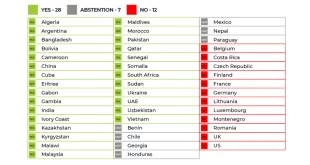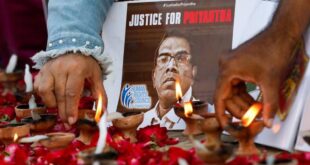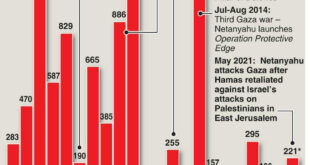
It is a story that has become a staple of the international news agenda: rains fail in Africa, crops die in the fields, populations start moving, and famine is declared. Famines are rare, but despite all the efforts of the humanitarian community, they do still occur, and this time it is southern Somalia where a combination of severe drought, high food prices and insecurity is putting the lives of millions at risk.
Ever since the devastating 1984-85 famine in Ethiopia, the media has turned its attention with unerring regularity back to stories about death and misery in Africa, illustrated by heart-wrenching pictures of severely malnourished children. At the United Nations World Food Program, we are often asked whether there is any point in pumping money into food assistance, when there seems to be no end in sight to the tales of misery, hardship and starvation.
It is a fair question, and the growth in social media in recent years has given us a greater opportunity to engage in constructive dialogue with potential donors, supporters and campaigners in the fight against hunger.
The questions that people want answered are why this is happening again, what is being done and how we can assist the most vulnerable — especially children — who are caught up in the latest Horn of Africa drought crisis.
This is a time when many people in donor countries are facing their own personal credit crisis, when governments are grappling with shrinking budgets and support for charity is focusing ever more sharply on problems closer to home. Since World Food Program is an organization that depends entirely on voluntary donations, we need to respond quickly if there is any danger of donor fatigue setting in.
Our answers are simple and compelling:
• The cycle of drought in the Horn of Africa is becoming more frequent, and while we cannot change weather patterns, we can do more to help communities in areas that depend on natural rainfall. United Nations agencies including the World Food Program and the Food and Agriculture Organization, nongovernmental organizations like Oxfam and regional governments are working to build resiliency so people living in drought-prone areas are better able to cope on their own.
While humanitarian agencies work on longer-term sustainable solutions, we have to keep saving lives. The World Food Program estimates more than 11 million people will need food assistance in the Horn of Africa over the next six months. Many of them are vulnerable children, and we are working with others like the U.N. children's agency, UNICEF, to make sure their nutritional needs are met.
There is no margin for error when it comes to building healthy brains and bodies among young children. Get it right and you provide a foundation for a healthy, productive life. Get it wrong and the future prospects look grim. This is why our response to the Horn of Africa crisis could see the biggest-ever deployment of highly nutritious supplementary food products for young children.
The declaration of famine in Somalia is a wake-up call for the world, but it has arisen due to a unique set of circumstances. The areas of southern Somalia that are facing the gravest hunger have been hit by a triple whammy of drought, high food prices and insecurity. At the same time, humanitarian agencies have been unable to access these areas after being driven out by militia groups on the ground.
Nobody is underestimating the scale of suffering in the Horn of Africa region, but if U.N. humanitarian agencies, national governments and nongovernmental groups had not invested so much time and effort into preparing communities for the probability of another drought, the numbers needing assistance could have been much higher. If agencies were able to have unhindered access to hungry communities in southern Somalia, there would not have been a famine and the numbers needing food assistance in that area would have been lower.
These are three good reasons why anyone who is able to give should support the humanitarian response in the Horn of Africa. Millions of lives are at risk and every contribution, big or small, is welcome. To donate to the World Food Program's Horn of Africa online appeal, go to wfp.org/hornofafrica.
The opinions expressed in this commentary are solely those of Greg Barrow.
 Sri lanka Muslims Web Portal Diversity and Inclusiveness
Sri lanka Muslims Web Portal Diversity and Inclusiveness



